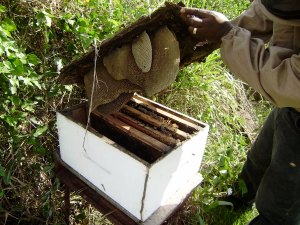Due to popular demand I will attempt to immortalize an incident that occurred sometime in October of 2007.
For the first 6 months of my service I lived at the top of a ridge north of Arkersall, the name of which was Long Hill… and Long Hill was long. The route to town, ironically called “New Road”, was a crumbling ribbon of muddy sadness that most drivers tended to avoid. My days began with a 2 mile descent to town and ended with a grueling trudge back up the hill. I lived in the home of an elderly lady who treated me well and let me plant a garden on a small strip of hillside land above the road. I spent many an hour working on that garden and used it as a demonstration area for the erosion-control techniques I was promoting with local farmers.

Home
One of those farmers lived up the road. A goat herder, he would lead his herd out in the morning on the way to his field and gather them at the end of the day. Keeping a goat is relatively low maintenance. You tie it to a tree, it eats all day, and you bring it back at evening time, lest someone steal it. Agricultural theft, or praedial larceny, is serious business in rural areas. It was not uncommon for thieves caught in the act to be disassembled on the spot by an angry, machete-wielding owner. I had previously witnessed a tense altercation between a group of screaming farmers and a taxi driver who had hit a goat that jumped into the road. You do not mess with another man’s goat.

It knows your secrets
Unfortunately, this Golden Rule of the Bush was not on my mind as I rounded the final bend in the road and looked up to see a large ram goat feasting on my lovingly-cultivated rosemary bush. Exhausted after another punishing day, my shirt striped with crusty salt-sweat rings from trudging through the bush with a guy who was convinced his yams cured tooth decay, I stood there in the road, watching this horrible thing devour a hard-to-find herb I had hauled half-way across the country to bring to that isolated corner of the universe because I was going through Italian food withdrawal and ached to cook something with a taste of home.
I voiced my displeasure, yelling with as much force as one could muster when dehydrated, commanding the ram goat, who I’ll call Travis, to GTFO immediately. Travis raised his head, gazing soullessly at me through those empty rectangular pupils, their placid facade hardly containing the unholy darkness fueling the beast. He then casually lifted his tail, and in an act of pure spite, pooped on my basil.
Devoured with rage at such blatant sacrilege, I grabbed a small stone and cast it in Travis’ direction. It landed wide of the mark, and the goat, confident on the high ground, returned to the herbal buffet. I made several more valiant attempts, but my exertions were in vain. Throwing rocks at animals was a local art that people practiced from their earliest days. All I could do was fling curses. Travis turned his backside to me in a show of supreme insolence. Something surged within, and I grabbed a large rock that fit perfectly in my hand and let it fly with all I had.

"New Road"
It may have been an adrenaline rush fueled by the culmination of a great many frustrations, or a divinely-ordained moment of fate, but I launched that rock like a Biblical warrior. I can still hear the hollow crack that echoed along the mountainside as the stone smacked the base of the goat’s skull below the horns. Travis froze, looking like he had been struck by lightening, making no noise, just stiffening, tilting slowly to the side, then tumbling over the edge of the cliff. The hillside was eroded and crazy steep, so Travis rolled down violently, a hairy sack of horns and legs striking rocks and trees and coming to a stop in a dusty cloud at my feet.
“Oh shi…”
I sheepishly nudged it with the clay-caked toe of my shoe.
“Goat… Hey… Wake up goat!… Goat?!”
The whole thing happened in less than 3 seconds. Sprawled in the road, limp, tongue hanging out, the scent of chewed rosemary and goat piss heavy in the air; Travis had clearly checked out, and his return was seriously in question. Now I found myself standing over the prize component of someone’s livelihood, prodding its filthy corpse frantically, my pulse racing as I searched vainly for any hint of his.

...around the bend
Just as I was weighing the pros and cons of attempting CPR, I heard the calls of other goats, many goats, rising in the distance. Looking down the road I watched in horror as the herd turned the bend, knowing Travis’ owner was coming up behind. With no time to think about what I was doing, I grabbed Travis by the horns and dragged him to the side of the road, tucking his legs under his body and propping his head on a rock, eyes facing down, forming a hideous vignette of a goat at rest. Within seconds the herd arrived and the farmer waved at me, clutching his 36” machete. Oh good, he wants to talk.
We chatted for a few moments. He was in his forties and displayed the typical bush farmer physique: a godlike body of bulging musculature from constant physical activity graced with a gnarled, weather-beaten face making him seem twice his actual age. He commented on my haggard appearance, expressed pride in my living the rural life, and even gave me advice for working my garden… leading me to shoot a glance over at Travis, whose head was slowly sliding off the rock, still showing no signs of life. The farmer picked up on it and asked if I liked “that goat.” I nodded, even floating the idea of buying it from him, but he cited a ridiculous price that left little room for negotiation. Eventually the conversation ran off and he turned to make his exit.
Suddenly he stopped, turned back around, and walked over to Travis, grabbing hold of the tattered rope around the animal’s neck and giving it a sharp jerk forward. The goat slumped over and melted over the road. The farmer’s eyes flashed to me.
I froze, my eyes on his machete. This is it.
Sucking his teeth and making the quintessentially Jamaican sound of mild irritation, the farmer cursed Travis’ lifeless form, jerked again, then delivered a swift kick to the animal’s ribs. My eyes bulged, I wanted to cry out and fling the dark burden from my soul, to admit guilt, to spare even my hated enemy’s dignity in death, but before I could make a sound, the goat sputtered, gasped, and slowly got up.
What infernal sorcery is this?!
Travis wobbled a bit but otherwise fell into place with the rest of the herd following the farmer up the road. I sat at the side of the road and eventually managed to produce my first full breath for 10 minutes. This series of events took some time to process. It now ranks among the top 5 most intense moments in my life. The goat never violated my garden territory again, although he was probably eaten soon after.

River crossing to Long Hill
Over the years, I encountered a great many more goats, even implementing a goat-rearing project and having one take up residence under my house, but none of them possess anywhere near the amount of mental real estate that Travis claimed. That’s why I had to honor him with a name.
 The storm makes itself known with waves of wall-rattling thunder, and sheets of rain whipping through the live oaks onto the poorly-drained streets in the city’s Riverside neighborhood. Lightening may claim one or two trees or cast a couple blocks into darkness with a well-placed kiss. Water fills the street as the storm passes, drifting off around quitting time. Tomorrow it will repeat the process. The hotter it gets, the harder the storms. Woe to whomever gets caught in it.
The storm makes itself known with waves of wall-rattling thunder, and sheets of rain whipping through the live oaks onto the poorly-drained streets in the city’s Riverside neighborhood. Lightening may claim one or two trees or cast a couple blocks into darkness with a well-placed kiss. Water fills the street as the storm passes, drifting off around quitting time. Tomorrow it will repeat the process. The hotter it gets, the harder the storms. Woe to whomever gets caught in it.
















